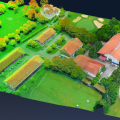
Mobile navigation services are already a standard feature of smartphones. Now, however, the trend is moving towards mobile navigation that works indoors. In a joint project, Fraunhofer Portugal and the University of Porto are attempting to achieve seamless navigation indoors using ultra-low-frequency magnetic field communication.
For their work, an international expert jury named the two research institutes this year's Galileo Master. Their navigation system for smartphones managed to best over 405 competition entries from more than 40 countries, and take home the EUR 20,000 grand prize in the ninth European Satellite Navigation Competition (ESNC).
Winners have been selected for 24 regional prizes, five special prizes, and two prototyping prizes. "The strong international response to this year's ESNC has once more proven its ability to boost innovation on a global scale. In close cooperation with our European and global partners, an excellent network has been established to create added value for satellite navigation technology," Bavarian State Minister Dr Wolfgang Heubisch stated in his opening speech of the Awards Ceremony.
The prizes were awarded by prominent representatives from the European GNSS Agency (GSA), the German Aerospace Center (DLR), Taiwan's Industrial Technology Research Institute (ITRI), and this year's ESNC title sponsor, HPI Fleet & Mobility AG.
The overall winner 2012 is a project that uses ultra-low-frequency magnetic field communication (ULF-MC) to ensure seamless, reliable navigation indoors and out.
The method earns its "seamless" label by enabling smooth transitions from satellite-based external navigation to ULF-MC-based navigation in indoor areas (such as department stores, underground parking garages, and airport facilities). This year's Galileo Master award was accepted by Dirk Elias on behalf of Fraunhofer Portugal and the University of Porto's Faculty of Engineering. The winning navigation solution, which already works on today's smartphones, is the result of a joint project involving these two research institutions.
Second place in the overall competition went to the winners of Bavaria's regional prize, Alexander Rügamer and Manuel Stahl from the Fraunhofer Institute for Integrated Circuits (Nuremberg, Germany). Their idea uses the encrypted Galileo Public Regulated Service (PRS) for real-time validation of georeferences and localisation while respecting related privacy concerns. The various applications fields (especially those related to mass markets) could see use, for instance, in implementing tolling systems or securing banking transactions.
Coming in third was Great Britain's regional winner, iGeolise Ltd., for its currently one-of-a-kind search engine. Following the notion "time is more valuable than distance", the Travel Time Platform displays search results to users based on travel duration; in other words, it provides the destinations people can reach within a specified timeframe. The application has already gone live commercially across the UK and been successfully tested in most major European countries.
Along with the distinction of Galileo Master, this year's ESNC also conferred the title of Galileo Pro – the overall winner in the Prototype category – for the first time. Dr Jim Li, Chief New Business Officer at the Industrial Technology Research Institute (ITRI) of Taiwan, presented the "Connected Vehicle" Prototype Prize to Wei Li and his team at the Taiwanese company HAITEC. The team developed an innovative driver assistance system based on three modern technologies, including the vehicle-to-vehicle communication system DSRC (dedicated short-range communication). This facilitates interaction among drivers, enabling them to warn one another of hazards on the road or remind others to switch off their high beams.







